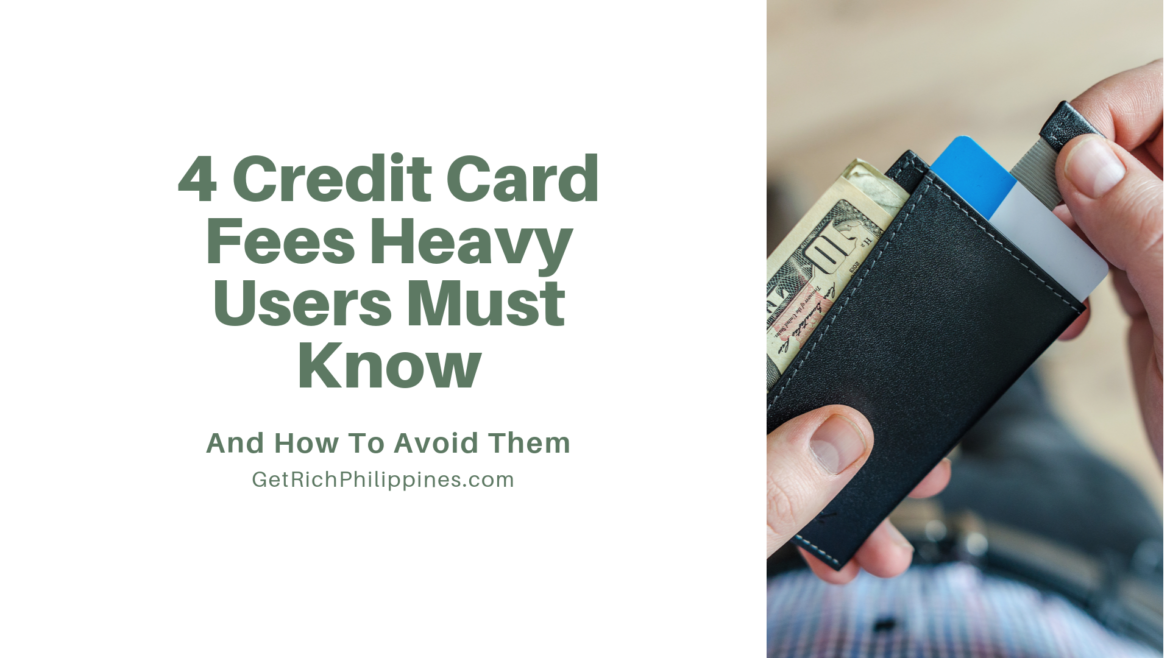
For many young professionals working in good-paying jobs, having a credit card is a must. With movie streaming services and online food delivery becoming a big part of a young professional’s lifestyle, credit cards are slowly becoming a yuppie’s best friend.
While having your own “CC” is a powerful thing, it comes with huge responsibilities. And failure to keep up with your credit card responsibilities will lead to a dark and horrible path of unimaginable debt. If you’re a credit card user, here are 4 credit card fees you need to know and how you can avoid them.
1. Finance charges
The idea of “swipe now, pay later” is the biggest marketing lure banks use to hook young professionals into getting a credit card. By using a credit card, users get to enjoy the things they want without having to think of how to pay for it on the spot.
What banks don’t tell credit card users is that they incur charges the longer they keep their credit: this is called finance charge. The finance charge is a fee that the card issuer puts on top of your CC’s remaining balance if you have any. Finance charges are usually 3.5% of your balance and accumulate the longer you have unpaid balances.
How to avoid this charge: Completely pay off your credit card every month! It’s the only way you can fully avoid getting finance charges. If that isn’t at all possible, then make sure you have a small credit balance. The smaller your credit balance is, the smaller the finance charge is. As a rule, I always pay double the minimum amount due on my credit card if my balance is too big. By doing this, I cover the finance charge that I will incur and also cover a little of my balance.
2. Late payment fees
Failing to pay your monthly credit card balance has very dire consequences and can keep you under debt for a long time. Many banks and credit card issuers impose a late payment penalty fee for users who don’t pay their card on time – if you pay late; you get a late payment charge on top of other charges.
How to avoid this charge: Simple! Pay your credit card on time! Know when your cutoff date is and when your bill is due. Pay on time even if it’s just the minimum amount due and you can easily avoid this charge.
3. Over-limit fees
Just like all things, credit cards have a limit. Depending on how the bank screens you, your credit limit could be as low as 15,000 to as high as 200,000. It’s important to know your limit because the bank will ask for an over-limit charge if you go overboard.
How to avoid this charge: Command responsibility of your credit card usage. Know your limits and how you will use this limitation wisely. Having a credit card is a responsibility, and banks know they can make a buck from human impulsiveness and lack of responsibility.
4. Annual fees
Last, are annual fees. Right before you get a credit card, you’ll be told that there’s an annual fee you have to pay. But it’s only when you finally have to pay for it that you’ll feel the overbearing weight of this charge (some AFs can be as high as 3,000 pesos!) Not all annual fees are charged at the beginning of the month; some annual fees are charged on the month you got your credit card approved. So don’t be surprised if you suddenly see a spike in your CC bill in the middle of the year.
How to avoid this charge: There are a couple of ways to avoid annual fees. One is to ask for it to be waived when you see the AF appear on your billing statement, but that’s subject to the approval of the bank and how good of a credit card users (and payer) you are. Another is to get a credit card without an annual fee. This is usually through promos or new CC launches.
Conclusion
Having a credit card has advantages and disadvantages; choosing to get one or not will not give you an edge towards financial freedom. What matters is how well you can handle the responsibilities if you do choose to get one. Always remember the wise words of uncle ben from Spiderman: “With great power comes great responsibility”.


